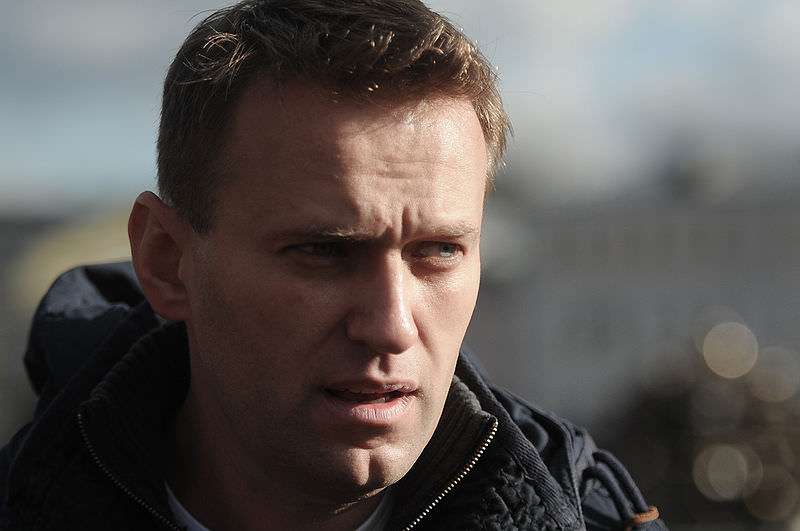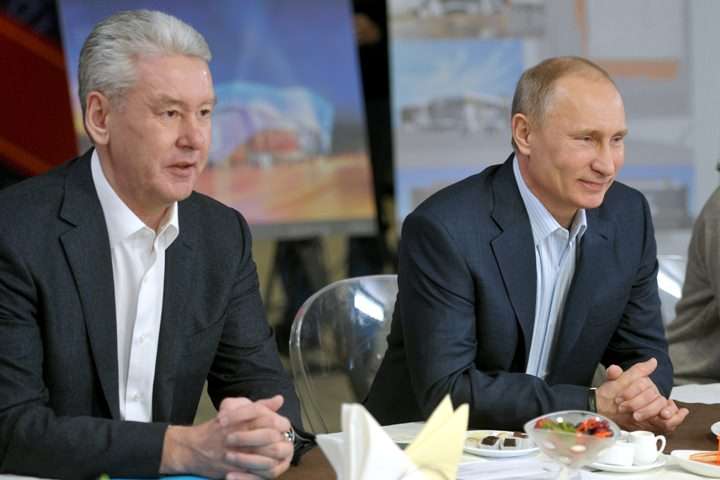Is Alexei Navalny Russia's Ron Paul?
Moscow's election this weekend will help gauge the future of freedom in Russia.

Imagine former Congressman Ron Paul challenging New York City Mayor Michael Bloomberg for one of the most powerful positions in the country. Then, throw in political trickery, media blackouts, office raids, and detentions. The analogy is imperfect, but it may be the closest way to understand one of the world's most important elections happening this year. The election is for the Mayor of Moscow and it takes place this Sunday. Its outcome will help gauge the future of freedom in the world's largest country, a significant issue both nationally and internationally.
Alexei Navalny (pictured at right), who has become the face of Russia's opposition movement, is a unique figure in Russian politics. The lawyer-turned-grassroots-activist-cult-hero has been optimistically described as Russia's first "American-type politician" for his transparency and consistency. Navalny is rough around the edges, and not unlike Ron Paul, advocates for free markets and calls out corruption. He openly and boldly calls the ruling class "crooks and thieves" and attempts to shatter the perception of their superiority, asserting to citizens that "people in the Kremlin are neither superior to you intellectually, nor better informed."
He faces off against a national juggernaut.

Sergei Sobyanin (pictured with Vladimir Putin), the current mayor, is running technically as an independent. However, he is a longtime member of President Vladimir Putin's United Russia Party, which also controls the majority of Russia's parliament, the State Duma. Sobyanin is a close ally of the president and has held important federal positions in the past. He is considered a potential successor to Putin.
The importance of the office in this face-off between Navalny and Sobyanin cannot be underestimated.
The "mayoral election in Moscow is not local politics" explains Navalny-supporter Vera Kichanova, a municipal deputy in Moscow and libertarian member of the opposition. In fact, the position is roughly the third or fourth most important in the nation.
The city operates as one of the 83 federal subdivisions of Russia, which are comparable to states in America. Covering a massive swath of land and boasting a population of 12 million, Moscow is not only Russia's most populous city, but all of Europe's. The capital city is a potent crossroads for politicians and billionaires.
"Moscow is an absolutely unique region, it is often said… that Moscow and Russia are two different countries," says Kichanova. The mayor of Moscow is federally on the same level as presidents of republics within the Russian federation. Think of Moscow as an autonomous New York City and Sobyanin as a much more powerful Bloomberg.
Tensions are high, because this is the first time in a decade that Muscovites will vote for their leader. Elections were replaced by appointments, essentially overseen by Putin himself, in 2003. Back then, there was no Navalny and no opposition movement. Neither side can predict how the thousands of activists, who range from libertarians to Marxists, will turn out at the polls. Perhaps more nerve-wracking is that they do not know how the opposition will react when the votes are in. Kevin Rothrock, a Russian affairs analyst at Global Voices, speculates that Navalny's supporters may protest if they don't see a favorable outcome.
The stakes are set even higher, because either side may expose a chink in the other's armor. Regarding the Kremlin, "the system is weakening, it's not as strong as it used to be," says Mark Adomanis, a specialist in Russian economics and demographics and Booze Allen Hamilton consultant, "this election will be another game-point in that." Putin, Sobyanin and Co. rely on strict, stable rule and succession of power to oversee the increasingly activist Moscow. Nevertheless, the establishment faces international pressure to keep the election fair, as there is a history of questionable results. Sobyanin walks a tightrope by avoiding debates, and if anything, as the Moscow Times points out, he want to downplay voter interest and keep turnout low.
Navalny himself has much on the line. He currently faces five years in a corrective labor colony for questionable charges of embezzlement from a state-owned lumber company. How well he does in the election may affect his punishment. "How they treat him over the next month or two – that matters a lot," says Adomanis, but notes that the estblishment is "not going to show their hand on that." The opposition has a lot to lose if he goes to prison. Without a singular face like Navalny, the young movement's varied agendas may cannibalize each other or simply fizzle out in disillusion.
The opposition candidate has several factors working in his favor.
He is drawing unprecedented hype. Navalny's web-presence and anti-corruption initiatives have snowballed into serious recognition. Additionally, he is "absolutely innovative for Russia. He attracts volunteers, he accepts donations, he involves his supporters in dozens types of activities," says Kichanova. While these may be common to U.S. politics, they are new and exciting methods to Moscow, and only Navalny seems to have mastered them. "His rivals have to copy his methods but it usually looks ridiculous," Kichanova explains.
"The real question is whether or not he'll be able to get to the second round," says Rothrock. Currently, Navalny is polling around 20 percent. This may seem low, but along with the numerous other minority parties running, the main objective is to keep Sobyanin below 50 percent. If the opposition can achieve that, the top two candidates will have a runoff election. This could give Navalny a chance to build more momentum.
Navalny has the establishment cornered, at least on one front. "The corruption issue is a legitimate weakness of the Kremlin and they have no good answer," says Adomanis.
None of this is to say that Navalny is flawless or that Sobyanin does not have the deck stacked in his favor. Many questions have been raised about Navalny's nationalistic sympathies, his ability to lead, and the fact that free market ideas simply are not that popular in Russia. Likewise, the incumbent is not unpopular. And he's the incumbent. "Sobyanin almost certainly will be announced as the winner even if he doesn't collect the most votes," asserts Paul Goble of the Institute for World Politics.
Russia's political development progress is not simple or linear. It's "not necessarily more democratic" than it was a few years ago, says Rothrock, "but it is different." The nation's political climate is changing quickly and unpredictably. The police will be out in full force, and Russia will not be quite the same after Sunday.
This is what makes the election worth watching, regardless of the apparent victor.
The world will see a balancing act on the part of the powers that be. The world will also see if the Russian opposition is in it for the long haul, if they can maintain cohesion, and if they can find more figures like Navalny to expose corruption and present legitimate alternatives for the voters and push the nation toward democracy.


Show Comments (10)